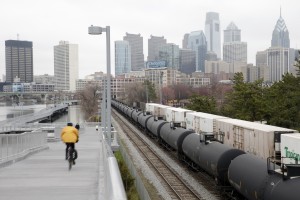Report urges more than two dozen measures to make oil trains safer
-
Jon Hurdle

(AP Photo/Matt Rourke)
Oil trains like this in central Philadelphia would be subject to more safety measures if new recommendations are adopted.” credit=”(AP Photo/Matt Rourke)
Pennsylvania’s oil trains could be made safer through a number of steps, more inspections, additional technology, lower speed limits, and improved preparation for emergency responders along the routes, according to a report released on Monday.
Gov. Tom Wolf commissioned the report amid growing fears that a derailment by one of the trains carrying millions of gallons of crude oil across the state could lead to catastrophic explosions in densely populated areas like Philadelphia.
The long-awaited report, written by Allan Zarembski, an expert in rail operations and structures at the University of Delaware, said there is “concern about the level of risk” on lines where Norfolk Southern and CSX haul oil trains, even though safety measures recently taken by the railroad industry and the U.S. Department of Transportation have been “of great value.”
Zarembski proposed 27 measures designed to prevent derailments, improve the resilience of tank cars in the event of a derailment, and help state and local emergency responders to deal with a catastrophic event, such as the oil-train explosion that killed 47 residents of Lac Megantic, Quebec, in 2013.
To make tank cars more resistant to puncturing, the report recommended installing improved head shields; increasing the thickness of tank shells; protecting valves, and reducing train speeds.
It called on the Commonwealth of Pennsylvania to “encourage” both of the railroads to install Positive Train Control technology – which can automatically slow speeding trains — as soon as possible in order to comply with new federal regulations set after the deadly Amtrak derailment outside Philadelphia in May.
It urged NS and CSX, both of which haul oil trains through Philadelphia, to voluntarily reduce oil-train speeds to 35 m.p.h. in cities with a population of more than 100,000 people. That speed reduction, if adopted, would further reduce a 40 m.p.h. limit set by the U.S. Transportation Department in its own updated regulations, issued in May.
The report also urged officials to set a series of minimum inspection standards. These include requiring track geometry to be tested at least four times a year, and designating state and local officials to work with the two railroads on improving safety standards.
Pennsylvania Emergency Management Agency officials should continue to work with both railroads to provide information technology tools to emergency responders on oil-train routes, the report said. It also urged PEMA to conduct a full-scale emergency response exercise involving responders from communities along key oil-train routes.
During a conference call with reporters, Zarembski said his recommendations were based on reducing the risk of a derailment or explosion, and on their practicality as steps that could be implemented by the railroads. The proposals do not rely, for example, on technology that has not been developed yet, he said.
Zarembski said he focused the recommendations on measures that could be taken by the railroads themselves, or by states without recourse to other levels of government, especially the federal government, which regulates the railroad industry.
He acknowledged that the railroads are already working on some of the recommendations but argued that his proposals, if adopted, would raise safety standards beyond current levels.
“Yes, the railroads are doing many of the things that we say, but the question is, can we get the railroads to do it at a level where we can reduce the risk further,” Zarembski said.
John Hanger, Gov. Wolf’s Secretary of Planning and Policy, said the state will implement the five measures over which it has direct control, including getting inspectors to include yards and sidings in their inspection program, and supporting the creation of national standards for crude by rail.
Although the state can’t implement Positive Train Control, it is already encouraging railroads to install the technology, as advocated by the report, Hanger said.
In a statement, Gov. Wolf said he had urged the railroads to improve safety and had called on the Obama administration to speed up regulatory action to make oil trains safer.
“Every week, roughly 60 or 70 trains carrying crude oil travel through Pennsylvania destined for Philadelphia or another East Coast refinery, and I have expressed grave concern regarding the transportation of this oil, and have taken several steps to prevent potential oil train derailments,” Wolf said.
Clean Water Action, a Philadelphia community group that opposes the oil trains, welcomed the report’s call for more inspections and reduced speeds.
“Clean Water Action was especially encouraged by those recommendations that will improve preparedness for communities along crude by rail routes and making sure adequate resources are in place to address an oil spill,” it said in a statement.
Neither Norfolk Southern nor CSX responded specifically to the report’s recommendations but said they are continuing to upgrade tracks and the technology that can detect any defects in the tracks or trains.
Norfolk Southern said its hazardous cargoes, including crude oil, safely reaches their destination “99.998 percent of the time” while CSX said it has made “significant investments in the tracks used for oil trains in the last two years.
















